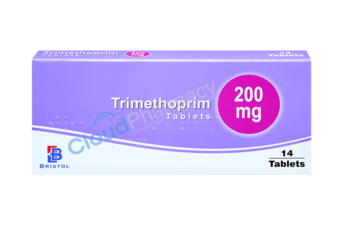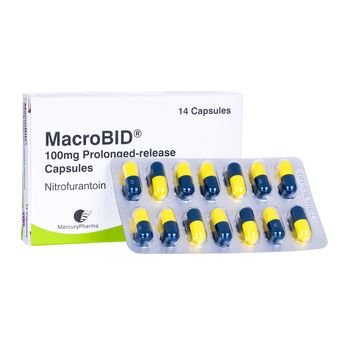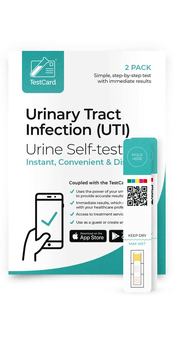Cystitis (UTI)

More information
Introduction
Cystitis is a relatively common type of urinary tract infection (UTI). Cystitis can manifest as an acute condition where the symptoms set in quickly, or a chronic condition that manifests as recurring infections. Generally, cystitis isn’t dangerous, but it can cause pain and discomfort in those suffering from it.
Treatments
More information
Once an online consultation has been been approved by our medical team, our pharmacy will safely prepare and ship your treatment to you in discreet packaging using Royal Mail or DPD.
What Is Cystitis?
Cystitis is characterised by an inflammation of the bladder. This means that the bladder becomes irritated and swollen, causing uncomfortable symptoms. Cystitis is usually caused by a urinary tract infection (UTI), which is a bacterial infection in the bladder or urethra. While cystitis can affect anyone, it is more prevalent in women.
What Causes Cystitis?
Cystitis is typically caused by a bacterial infection, but it can also occur if the bladder is irritated or damaged because of something else. The majority of cases are thought to be caused by bacteria that gets into the bladder through the urethra.
In the bladder, bacteria can multiply and lead to an infection. While bacterial infections are the most common cause of cystitis, the condition may also occur due to certain medications, chemicals, radiation or foreign bodies like catheters.
While it is not always clear how bacteria make it into the urethra, some things seem to increase the risk of it happening.
Having sex increases the risk of bacteria infecting the bladder.Other things that might increase the odds of developing cystitis are having a urinary catheter or using a diaphragm as a means of contraception.
Types of Cystitis
Cystitis is either acute or interstitial. Acute cystitis is characterised by its sudden onset, whereas interstitial cystitis is a chronic, long-term condition. Both types of cystitis have a range of causes that determine their type:
- Radiation Cystitis: radiation therapies in the pelvic area can cause inflammation in bladder tissue
- Bacterial Cystitis: when bacteria outside the body enter the urinary tract through the urethra and multiply. It is vital to treat bacterial cystitis as quickly as possible since the infection can spread to the kidneys if it is untreated
- Drug-induced Cystitis: certain medications can lead to cystitis as they can cause inflammation in the bladder as they exit the body
- Chemical Cystitis: Interactions between certain hygiene products and the bladder may also result in cystitis
Symptoms of Cystitis
The most common symptoms of cystitis are:
- Pain, burning or stinging while urinating
- The need to urinate more frequently than usual
- The need to urinate immediately after leaving the bathroom
- Cloudy, dark or strong-smelling urine
If you notice a fever alongside any of these symptoms, it could be a sign of a kidney infection. This could be very serious. You should consult with a doctor immediately if you notice any of the following symptoms:
- Severe pain behind the pubic bone or in the lower back
- Pain in the sides of your lower back, where your kidneys are located
- Nausea and vomiting
- Blood in the urine
Is Cystitis Contagious?
While cystitis can be uncomfortable, generally it isn’t dangerous if attended to, and it is not contagious.
The infection cannot be passed on to someone during sexual intercourse. However, you might still want to tell a partner if you are suffering from cystitis as the discomfort it causes can make intercourse painful.
How Long Does Cystitis Last?
The timeframe for recovery from cystitis can vary depending on the severity of the condition.
Usually, if the cystitis is mild, it should clear up on its own within a few days. However, sometimes, you might need to take antibiotics to help clear the infection more quickly.
You should consider discussing the condition with your doctor if you have had cystitis for more than three days and the symptoms have not improved. Additionally, you should talk to a doctor if you frequently get cystitis, have severe symptoms, are pregnant with the condition, or are a man with cystitis.
Why Do I Keep Getting Cystitis?
Recurrent cystitis is a problem for some women. It is characterised by recurring bouts of the condition, which can sometimes present as two or three separate infections in the space of a year.
Your body has defences to prevent bacteria from proliferating and causing cystitis. For example, mucus in the vagina and around the urethra is mildly acidic, which can impede the growth of bacteria.
Typically, it isn’t clear why some women experience recurring cystitis. Usually, the defence systems that aim to prevent bacterial growth are functional. However, sometimes, there can be slight variations in the barriers preventing bacteria from establishing that allow pathogens to multiply.
Foods to Avoid With Cystitis
Most people with interstitial cystitis experience sensitivities to some foods. While the trigger foods can vary from person to person, there are some foods and drinks you should generally avoid or try to cut back on with cystitis. These include:
- Coffee
- Tea
- Citrus juices
- Fizzy drinks
- Spicy foods
- Artificial sweeteners
Cystitis Treatment
Cystitis treatment is simple and effective using antibiotics, this will more often than not clear the symptoms in a matter of days. In addition to antibiotics, over the counter painkillers like paracetamol or ibuprofen can help to manage the pain or discomfort cystitis causes.
At Cloud Pharmacy, we offer a range of effective cystitis treatment options that are available to buy through our websites, such as Trimethoprim tablets and Macrobid 100mg capsules. Once an online consultation has been completed and approved by one of our medical professionals, we will deliver it to your door the very next day (all orders placed before 3 pm).
FAQ
What is Cystitis and what are it's causes?
Cystitis is the inflammation of the bladder wall. This can be caused by a bacterial infection (usually by E. coli which lives harmlessly in the intestine) or from physical irritation or bruising during sexual intercourse. The bacteria move upwards via the urethra (the tube that connects the bladder to the outside world) and attaches to the bladder wall causing the pain, frequency and discomfort associated with cystitis.
How infectious is Cystitis?
Cystitis is an infection, however it cannot be transmitted like the common cold. Cystitis is not contagious; you do not need to worry about passing it on to others.
What is the treatment for Cystitis?
There are a number of different treatments for cystitis.
You can use simple sachets that make the urine less acidic and stop the burning sensation e.g Cystopurin, Cymalon, Potassium Citrate Mixture & Canesten Oasis.
As cystitis is a bacterial infection it can also be treated using antibiotics; Trimethoprim is the most common. It is eliminated from the body in the urine, therefore it occurs in high concentrations exactly where it is needed for effective treatment. Trimethoprim is available to treat cystitis in women through our Online Pharmacy. Other antibiotics can be used to treat cystitis if Trimethoprim is not suitable, these can be prescribed by your GP.
What are the symptoms of Cystitis?
If you have had a urinary tract infection before you may recognise the symptoms. These can include:
- a burning or stinging sensation when you pass urine.
- the urgency and increased frequency of passing water.
- only being able to produce small amounts of urine.
See the 'Symptoms' section above for a detailed overview of the symptoms of cystitis.When should I feel better after taking antibiotics?
The burning sensation, frequency of and the urgency of passing urine can start to subside in as little as a few hours but will usually resolve after a day of starting antibiotic treatment. After the initial symptoms have resolved you maybe left with a few days of irritation. You should never stop your antibiotic treatment early, even if you begin to feel better.
What can I take for the pain associated with Cystitis?
Over-the-counter painkillers, like ibuprofen, aspirin and paracetamol, are fine for treating the pain of cystitis. These can be taken with trimethoprim but always check with your pharmacist or GP if you are on any other medicines.
What do I do if I don't feel better after taking antibiotics?
Trimethoprim is eliminated from the body in the urine, this means it is present in large concentrations exactly where it is needed. It is normally prescribed straight away, without sending a sample off for analysis because it works so quickly.
If you have not seen an improvement in your symptoms within 48 hours you need to see your doctor face to face. Your infection may be resistant to the first line treatment of trimethoprim and they can send a fresh urine sample off for analysis to identify the bacterial cause of your infection. Your cystitis can then be accurately treated with a different antibiotic to which there is no resistance.
When I take antibiotics I sometimes get Thrush, why does this happen?
Thrush is caused when the naturally occurring yeast, Candida Albicans, overgrows in the vagina. This usually happens after a course of antibiotics because they reduce bacteria in the vagina that regulate the yeast. As the candida over grows the symptoms of thrush develop. This is completely normal and is easy to treat with a Fluconazole 150mg Capsule.
When I take antibiotics I sometimes get Thrush, why does this happen?
Thrush is caused when the naturally occurring yeast, Candida Albicans, overgrows in the vagina. This usually happens after a course of antibiotics because they reduce bacteria in the vagina that regulate the yeast. As the candida over grows the symptoms of thrush develop. This is completely normal and is easy to treat with a Fluconazole 150mg Capsule.
Can I treat Cystitis with cranberry juice?
Cranberry juice does not cure or treat the symptoms of cystitis but it is thought to stop the bacteria from attaching to the wall of the bladder and urethra. This makes is more useful for prevention rather than cure.
The evidence for this is limited with some studies showing that it does work and others showing it had little effect.
Guides
How it works
First...
Complete a quick eligibility check
Then...
Order your treatment
Finally.
Fast, confidential delivery to your door






















